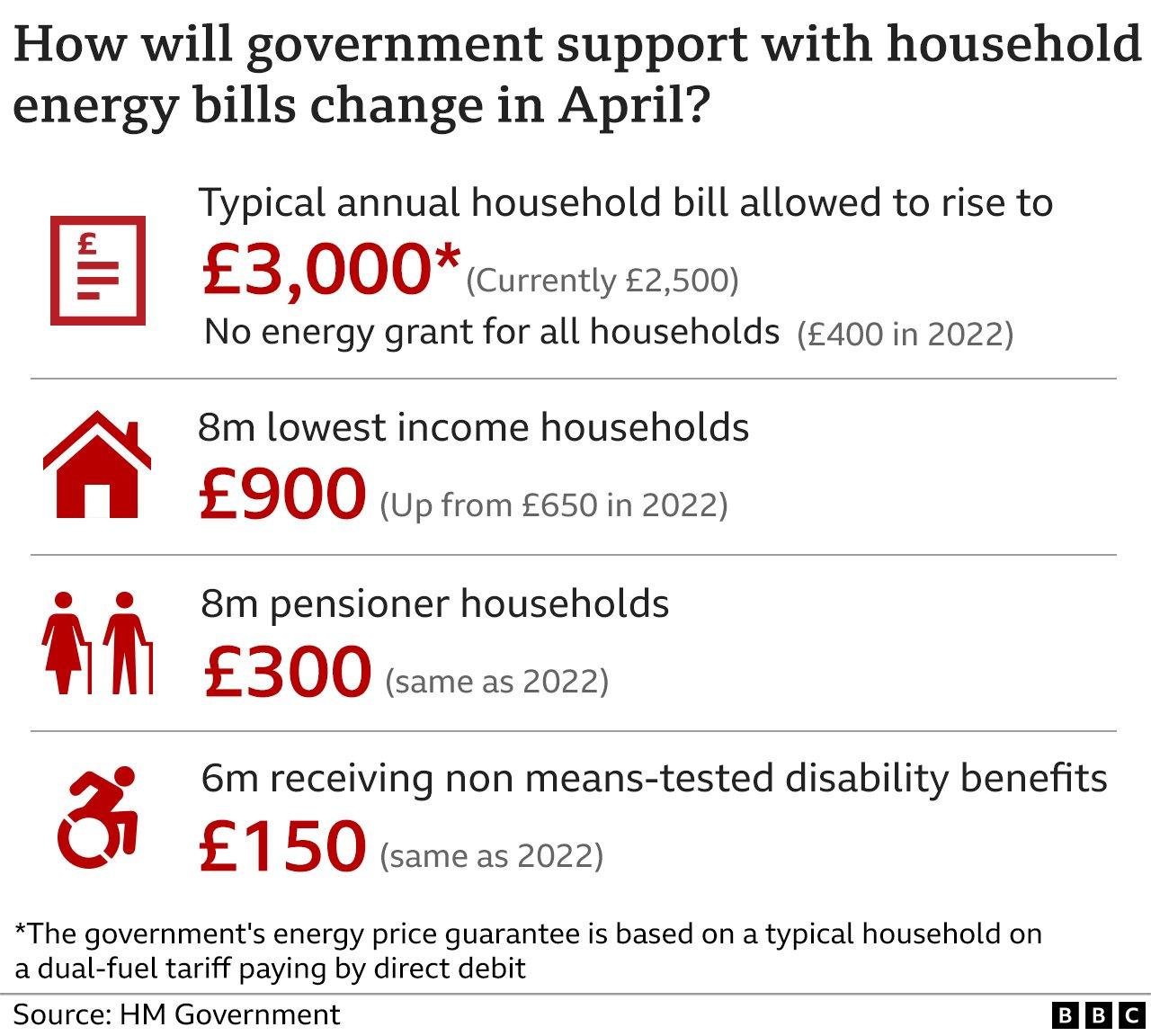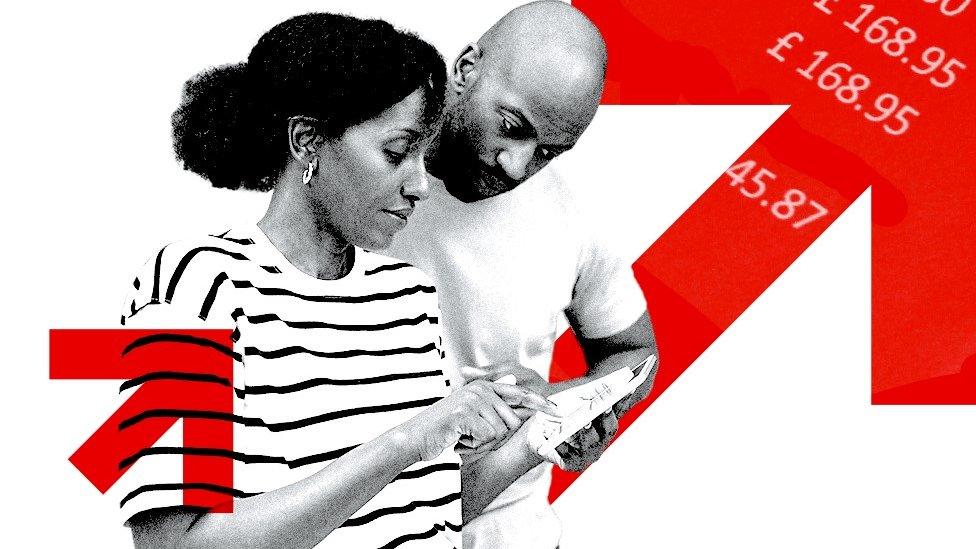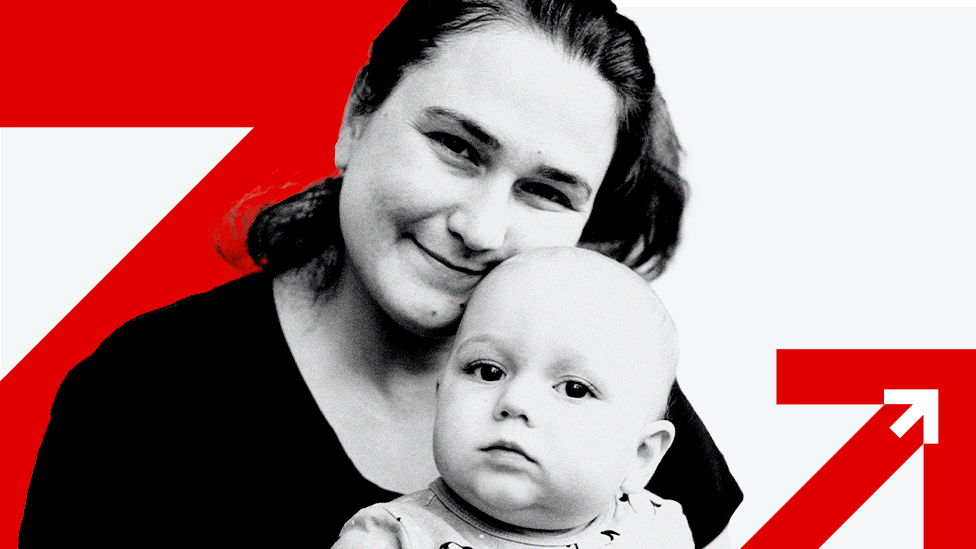Warm winter may lower energy bills later this year
- Published
- comments

Energy bills could fall later this year, a forecast suggests, but households are still certain to face higher prices in a few months' time.
A less generous government cap will increase the typical UK household gas and electricity bill from £2,500 a year to £3,000 a year in April.
But warm weather in Europe and high gas storage levels have led to falling wholesale prices faced by suppliers.
So a typical annual bill could fall to £2,800 in the summer, forecasters say.
If the prediction, from energy consultancy Cornwall Insight, proves to be correct, then the bill paid by 26 million households would again be governed by Ofgem's price cap, rather than the government's guarantee.
That could mean a lower-than-expected cost to the government, and ultimately taxpayers.
"We must remain cautious as the government has essentially been underwriting a volatile wholesale energy market - one which is likely to remain unstable throughout the year," said Craig Lowrey, principal consultant at Cornwall Insight.
"Even if energy prices continue at current levels - which is a big if - the costs to the government over the full period of the Energy Price Guarantee are still contributing to government borrowing and will ultimately fall at the feet of consumers in the form of higher taxes."
Even if the weather stays relatively warm, domestic bills would still be far higher than they were before the pandemic, and are unlikely to fall back to that level for many years.
How the price caps work
A huge majority of households in the UK have a variable or default gas and electricity tariff. The price per unit of energy is capped in England, Wales and Scotland at what is considered an appropriate level by the energy regulator Ofgem. The cap is set every three months.
Huge costs faced by suppliers meant that would have left a household using a typical amount of gas and electricity paying £4,279 a year from the start of January.
So, the government stepped in to cover some of that cost for people across the UK. Its Energy Price Guarantee means the typical household pays £2,500 a year now, rising to £3,000 a year in April.
That is still a massive hike on the bills people had been accustomed to. In the winter of 2021-22, the typical annual bill was £1,277.
Extra cost-of-living payments are primarily helping the more vulnerable with those higher costs.

Although bills are extremely high, the wholesale prices paid by suppliers - in advance of selling it on to consumers - have started to fall.
The winter in Europe has so far been unseasonably warm, hitting record temperatures in some places. Many European countries had also already filled their gas storage facilities.
If those lower wholesale prices hold, then consumers could feel the benefit later in the year, Cornwall Insight predicts.
It suggests that the typical annual household bill could fall to £2,800 in July to September, then be relatively unchanged at £2,835 between October and December.
This is far from guaranteed, as a cold snap in the coming months and more global tensions could quickly push up wholesale prices again, which spiked after Russia's invasion of Ukraine.
Much of the gas which continued to flow through pipelines from Russia in 2022 has now been cut off, so analysts warn that if a cold spell in January or February depletes reserves in Europe, they will be much harder to replenish, leading to even higher prices next winter.
The cost of government support through the price guarantee is still expected to total £37bn, according to Cornwall Insight.
Charities are calling on the government to offer more support to those in need, especially as the £400 discount for all billpayers this winter is unlikely to be repeated.
"While falling energy prices may offer some hope, these are not enough for consumers to feel any real gains," said Simon Francis, co-ordinator of the End Fuel Poverty Coalition.
"We urge the government to go further in the support it is providing, especially to the elderly, disabled, those with pre-existing health conditions and those with young children."
Meanwhile, businesses are waiting for the government to announce what it will do when a scheme fixing their energy bills expires at the end of March.
Firms are expecting the government help to be halved, although it is possible heavy energy users will get support close to current levels.
Related topics
- Published3 April 2024

- Published15 February 2024

- Published3 January 2023
